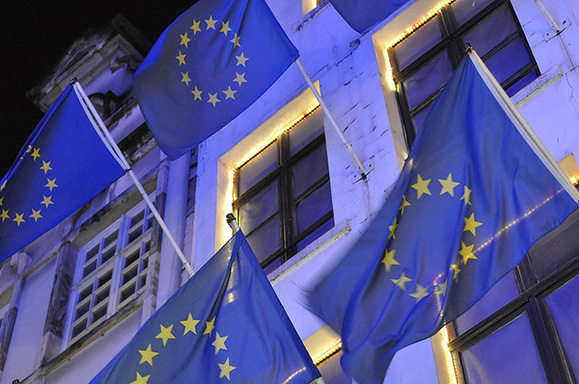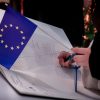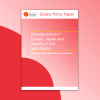Contents
Introduction, by Luis Simón and Ulrich Speck – 5
1. A failing Europe, by Ulrich Speck – 7
2. A strong and united European core, by Alexander Mattelaer – 13
3. An Atlantic revival, by James Rogers – 19
4. A strong China subverts the European order, by Alice Ekman – 25
Conclusions, by Luis Simón and Ulrich Speck – 31
Introduction
Europe’s future is not what it used to be. Ever since the global financial crisis broke out nearly a decade ago, Europe has been hit by one crisis after another. There has been a debt crisis, an economic crisis, an Arab Spring gone bad, a Ukraine conflict, a migration and refugee crisis, a subsequent wave of populism and nationalism running through much of Europe and a Brexit crisis. And now there is a Trump crisis, putting vital transatlantic ties into question.
Granted, the mood seems to have changed recently. Economic growth is back. And the election of Emmanuel Macron as French President has brought a fresh, energising approach to discussions on the future of Europe. This could well create new political momentum to tackle some of the structural challenges faced by Europe. However, whether the new drive will lead to changes beyond the level of the symbolic remains to be seen. There are deepseated, fundamental divisions in Europe over economic philosophies, foreign and security priorities and migration.
As the fulcrum of global power shifts away from Europe and the Atlantic, and given the ongoing uncertainty about the future of US foreign policy and engagement in Europe, the European order looks increasingly fragile, as do the institutions that embody that order. Beyond Europe proper, conflict and geopolitical competition are back and globalisation – with its vision of benign, harmonious global governance – appears to be under threat.
With the future becoming increasingly uncertain, there is a renewed interest in scenarios: how might the future look like if trends that are already visible today prevail and lead to massive changes? What if events suddenly change the course of history, as occurred in 1989? What is the purpose of European integration? What is it supposed to achieve or, for that matter, prevent from happening? What does a successful Europe look like? And a failing one?
At the Elcano Royal Institute’s Brussels office we have decided to contribute to the ongoing debate about Europe’s long-term future with a number of scenarios, looking at Europe in 2030. Our aim is to focus not on any particular institution (such as the EU or NATO) but on the broader European geopolitical architecture, paying special attention to the link between intra-European political relations and Europe’s role in the world. That is where we want to put our mark, and set this exercise apart from others. Our main focus is thus on the interaction between European states, and their relations with great powers, primarily the US, China and Russia.
The broader question looming over our exercise is whether Europe will be a geopolitical subject or an object, ie, an actor in its own right or a playground for great-power competition. It goes without saying that there is no way to address the question in black-or-white terms, but rather through a fifty-shades-of-grey lens. Here we sketch out four possible answers that rely on the views of four foreign-policy experts on how the future might unfold.
The first contribution outlines the nightmare scenario: a divided, ‘free for all’ Europe, in which the continent falls prey to penetration from several external actors as well as to the reverberations of intra-European competition. What happens if Europe fails? How does a Europe in which nation states have largely ceased to cooperate, and the EU and NATO either wither away or become irrelevant, look?
The second contribution takes a radically different point of departure: a united Europe. In this scenario, the EU succeeds in becoming both the key player in European geopolitics as well as a significant force or pole in the world.
The third contribution is a ‘rebirth of the West scenario’, in which the transatlantic framework remains the organising factor of both European geopolitics and Europe’s doings beyond Europe. It outlines a future in which the US and the UK emerge again as the leaders of a united West, and as the main focal points of European politics.
The fourth and final contribution presents a ‘strong China’ scenario, in which the mechanics of Chinese penetration in Europe are unpacked. Developing a scenario implies taking some risks. The future that might be can look very different from all four scenarios presented here. But we believe that thinking about scenarios is nevertheless of key importance to policy-makers, experts and the wider public. Not because they predict with scientific rigour what is going to happen but because they make it easier to discuss expectations and to bring into the open the many implicit assumptions about the future on which our political discourse is built.
The credibility of scenario-based exercises depends not so much on their methodology, but rather on the ability of researchers to identify major trends, connect those trends with each other and use their imagination and creativity to go beyond conventional images about the future. In this project, we left it largely up to the authors to draw on their individual expertise and make a journey into the unknown. While we as editors were keen to have the four scenarios speak to each other, we did not want to limit the creativity and inspiration of each individual expert. In order to ensure a certain degree of coherence and cohesion, we discussed early drafts at an expert workshop in Brussels in May 2017, where we had the opportunity to gather input from several officials from the EU, NATO and member states, as well as experts from the think-tank and academic worlds and the media.
Political actors make decisions based on certain assumptions. They have goals in mind, and are driven by visions of (a) desirable future(s), often plagued by images of nightmare futures. Scenarios help us spell out the desirable and the undesirable in greater detail. The aim of our project is to contribute to the discussion about possible futures for a Europe whose order is increasingly challenged in an increasingly volatile, contested world. It is an invitation to make a journey into the future. We found it intellectually stimulating and hope that our readers will enjoy the journey.
Contributors and editors
Luis Simón, Director of the Brussels office of the Elcano Royal Institute, and Assistant Professor in International Security at the Institute for European Studies of the Vrije Universiteit Brussel | @LuisSimn
Ulrich Speck, Non-resident Senior Research Fellow at the Brussels office of the Elcano Royal Institute | @ulrichspeck
Alexander Mattelaer, Director of European affairs at Egmont, The Royal Institute of International Relations, and Assistant Professor at the Institute for European Studies of the Vrije Universiteit Brussel | @ATJMattelaer
James Rogers, Director of the Global Britain Programme at The Henry Jackson Society in London | @james_rogers
Alice Ekman, Head of China Research at the Centre for Asian Studies of the French Institute for International Relations (IFRI) | @alice_ekman



